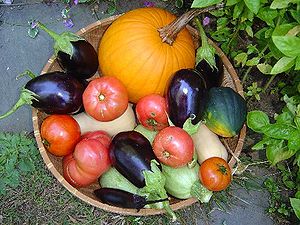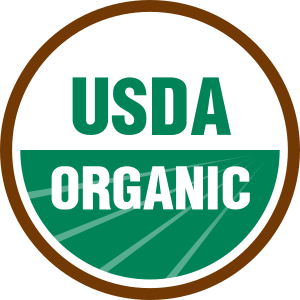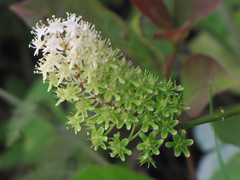A recent comment on Facebook got me to thinking, and inspired me to write this post.... A friend had posted some comments after watching the documentary,
Food, Inc.
(If you haven't watched this one, it is a must-see if you are at all concerned about the food you eat and staying healthy.) I shared with her some info on CSAs and finding
 Image via Wikipedia
Image via Wikipedia clean, healthy, locally grown food - which as you know is a topic near and dear to my heart! She was grateful and excited, and hopefully will get involved and her family will reap the healthy benefits!
However, another friend of hers commented on
Food, Inc., and said something about how she would prefer not to know what's in her food
since she has no control over it.
This comment was actually shocking to me.... Is this really what people think? Have we gotten SO far from producing our own food, that we actually think what we put into our bodies is entirely out of our control? This is so disturbing to me. No wonder disease and obesity are skyrocketing in our country. No wonder our children are projected to have a shorter lifespan than we do - if this is how we are approaching our food!!
YOU DO HAVE OPTIONS!!!
This blog is actually an effort to spread the word about some of those options, and educate people on the fact that not only are options out there, but they are often easy to find and implement.
Although these are mentioned here often, here is a quick summary of some of the options available for you to control your food sources, and what you are feeding yourself and your family:
Option 1: Buy locally grown food.
This could actually be broken down into a couple of different methods. Farmer's markets are probably the most well-known way to get access to lots of fresh, locally grown foods. Organic farmers feature their wares at many of these, so you can get the best of the best - Local AND Organic. You also have the opportunity to speak with the people growing your food, and ask them what kinds of treatments are used, and how things are grown, including the raising of animals. Are their cows grass-fed? Is their poultry raised on pasture? Are hormones or antibiotics used?
 Image via Wikipedia
Image via WikipediaIf you don't have time to go to the market every week, don't like taking the time to fight the crowds, or wish to develop a closer relationship with a particular farm/food source, you might look into a CSA.
CSA (community supported agriculture) farming is becoming increasingly popular throughout the US (and Europe). CSA programs give you the opportunity to purchase a share of a farm's produce up front at the beginning of the season. This benefits the farmers by giving them a built-in market so they know how much to grow, as well as funds right when they need them most. You, in turn, get to know a particular farm and its growing habits quite well, and you get a share of the farm's produce on a weekly (or other regularly scheduled) basis. Most CSAs offer farm visits and tours, so you can even see your food growing (or "meet your meat!"). Most also have newsletters and regular updates on the growing of your food, many offer recipes and preparation tips for unusual items, and many now offer organic options.
Last but not least, many large grocery store chains now even carry some local produce, at least during the summer months. (Try health-oriented stores like Whole Foods, for a larger selection.) Although you won't have access to the local farmers to ask questions, at least you can often find foods that are organic and grown close to home. Often they have the name of the farm listed, so if you wish, take the time to look them up and give them a call to inquire more about their growing practices.
Option 2: Grow your own!
We won't spend that much time on this one, as this is what most of this blog is about, so browse our archives for lots of articles and tips on growing your own sustainable and organic garden, or even raising your own poultry for eggs and fresh meat. It's really not that difficult. And don't feel like you have to grow
 Image via Wikipedia
Image via Wikipediaabsolutely everything and support your entire family on your own garden's produce. If you can, and you wish to, this is an awesome way to go! However, even if you can only provide a part of your family's food, at least you know where SOME of what you're eating comes from, and every little bit counts. Start with a small corner of the yard, get the kids involved, or if you're in an apartment or condo, try some container gardening. Just about everyone can grow at least a few items, no matter where you live, and contribute in at least some small amount to your table.
Option 3: Do both.
Don't feel like you have to limit yourself to one or the other of the above options. It is perfectly okay to combine them! If you have just a small bit of garden space, grow what you can, and join a CSA for the rest. Or grow a larger garden, and pick up a few things at the farmer's market when needed. But whatever you do, please don't believe that you have no control over your food supply! This is simply not true (at least in the US), and it is a dangerous road for us to travel these days - and certainly a harmful thing to teach our children!
What you eat is actually one thing that you have a LOT of control over. Most people either just don't make it a priority to seek out better foods (hopefully this isn't you), or they don't know where to start. I hope this blog gives you some ideas to help empower you to take back your food supply, and start contributing to your own family's well-being in an involved way. Yes, you CAN! :-)
Some educational sources to help you learn more:
http://www.newholisticliving.com/sustainablegardening.html
http://www.newholisticliving.com/csa.html



























